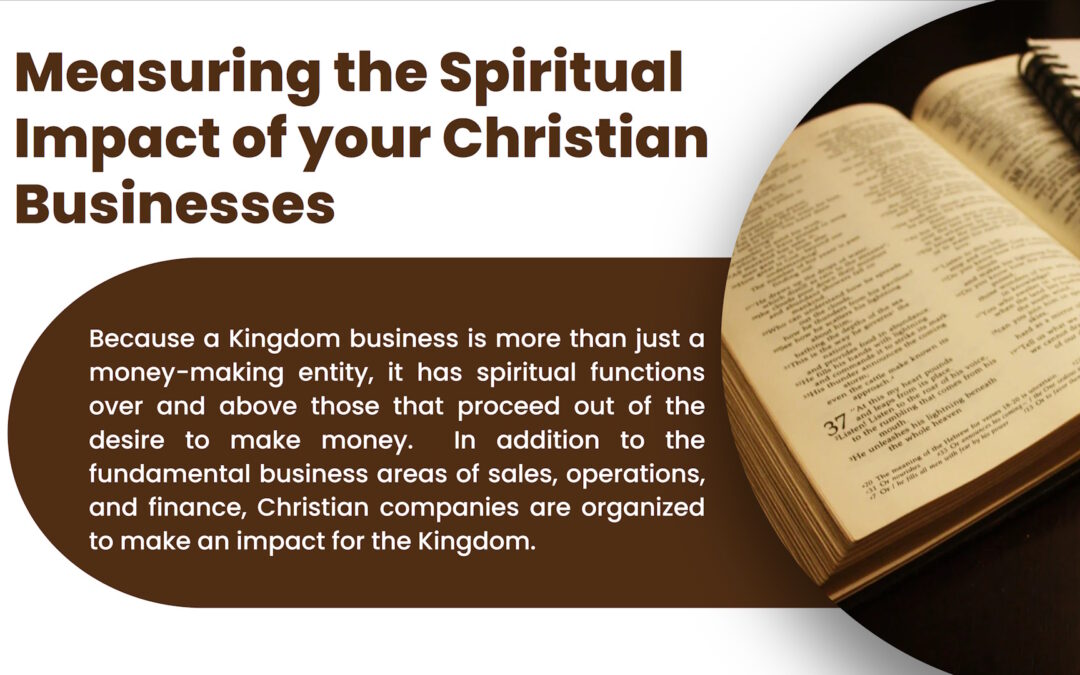In an earlier piece, I discussed the concept of measuring business functions and provided a set of recommendations on which and how to measure them. In this post, I’m going to extend the practice of measuring business functions to measuring the spiritual impact of a Christian business.
Because a Kingdom business is more than just a money-making entity, it has spiritual functions over and above those discussed above. In addition to the fundamental business areas of sales, operations, and finance, Christian companies are organized to make an impact on the Kingdom.
In The Good Book on Business, I identified these purposes of a Kingdom business:
1. To be the primary venue for the implementation of mankind’s function – to work.
2. To accomplish a specific task given to it by God.
3. To provide a venue in which to relate to God.
4. To provide a venue for the manifestation of spiritual gifts.
5. To develop Kingdom leaders.
6. To provide economic security and blessings for its employees, owners, and community.
7. To provide a common theme and purpose to unite families.
8. To build faith and spiritual maturity in the owners and employees.
9. To provide a venue for the outlet of mankind’s creativity.
Remember, a system of measurements serves to focus the organization on those activities that move it toward the completion of its mission. Assuming that your organization has, as one of its corporate objectives, a statement that emphasizes its Kingdom orientation and purpose, then it follows that a system of measurements should be put in place to harness the assets of the organization, and the time and resources of at least some of its employees, to accomplish the Kingdom functions. So, in addition to the primary business functional areas of sales, operations, and finance, Kingdom companies ought to have an additional basic business area of “Kingdom Impact.”
Here’s a look at each of the Kingdom functions, described above, and a suggestion as to what kind of measurement could be put in place. Think of creating a company dashboard, and capturing, reporting, and fine-tuning these activities each month.
Application:
1. To be the primary venue for the implementation of mankind’s function – to work.
This would be a results measurement, noting the total number of people employed. If you regularly use sub-contractors for major processes, then the number of people employed by key contractors should be added.
So, on our Kingdom efforts dashboard, you could report monthly on:
The total number of people employed.
2. To accomplish a specific task given to it by God.
This assumes that you believe that the business fits into God’s greater plan by accomplishing some task. It may be, for example, “to bring the Kingdom into the world of …….,” or “to provide cost-effective ……….” This is where you describe the fundamental mission of the company.
You may already be measuring your effectiveness in doing that which is your mission. If not, think about these result measurements on a monthly basis.
The number of units sold.
The number of customers impacted.
The market share.
3. To provide a venue in which to relate to God.
This is a tough one to quantify because it speaks to an individual’s relationship to God. Let’s pass on this one.
4. To provide a venue for the manifestation of spiritual gifts.
This is difficult as well, as God distributes spiritual gifts according to His will, and mankind has little to do with it. Let’s pass on this as well.
5. To develop Kingdom leaders.
While much of this work is God’s to do, business executives can certainly pro-actively contribute. Identifying potential leaders, developing training and education, intentionally putting them into positions that require them to acquire new skills and enlarge their responsibility are all activities that a Kingdom executive team could implement. Initially, you can focus on the end result of that effort:
The number of people promoted into more challenging positions.
If you were to grow this effort to the point that it acquired a critical mass and became an everyday effort, you could then create a series of activity measurements to keep track of the quantity and quality of your key activities.
6. To provide economic security and blessings for its employees, owners, and community.
While some of this may be measured in the number of people employed, the economic impact of the organization can and should be, larger than just that. For example, you could measure the total number of people employed, and add to it the owners and investors who realized some financial gain and then add the number of people within your vendors who were blessed to do business with you.
Then you could add to it the number of people impacted by benevolent efforts of the organization, by noting the number of people impacted through those efforts. Add all that up every month and you would have a gauge of the impact of the business in providing and enhancing economic security.
The number of people economically impacted.
7. To provide a common theme and purpose to unite families.
In Chapter Twelve of The Good Book on Business, I share observations about the role of business in the lives of families. Business, in God’s eyes, is not a competitor for a family’s time and attention, but rather a focus point for them, uniting the family around the work of a business.
While ‘unified families’ may be a result that would be difficult to measure, you could do a simple annual questionnaire for each employee on the state of their family. You could set up a system to rate
The number of families intact at the end of the year.
If that sounds too aggressive, then you could measure certain company-created family-friendly activities, like:
The number of family events organized or sponsored by the company.
That might include monthly Friday afternoon barbeques, company picnics, and softball teams sponsored, etc.
Since Kingdom families work together, you could also measure:
The number of family members hired by the organization.
8. To build faith and spiritual maturity in the owners and employees.
Again, this is a difficult one to attempt to measure results, although you could keep track of
The number of people baptized into Christ.
A focus on activities is a more likely effort. You could easily measure:
The number of people prayed for/with by Christian executives.
The number of people meeting in Bible studies and support groups organized by the company.
9. To provide a venue for the outlet of mankind’s creativity.
This is another one of those difficult-to-measure functions. If I were going to attempt to do so, I’d look at the end result of creativity applied by assessing the quantity of ‘new’ things: New products created, new marketing programs developed, new jobs descriptions created, new sales literature created, etc.
Additional Thoughts
All of this may sound radically different from any business practices you’ve implemented in the past. That’s too bad. For generations, Kingdom businesses have been slighted in the perspective of the professional clergy, and as a result, have only in the past couple of decades begun to be acknowledged as ministries in and of themselves.
As an unfortunate consequence, generations of development of the kingdom impact of businesses never took place, and we are only now beginning to grasp the potential for kingdom impact in a business, and the management tools and techniques necessary to reach our businesses’ potential.
*CBI-124, CBI-134



Trackbacks/Pingbacks